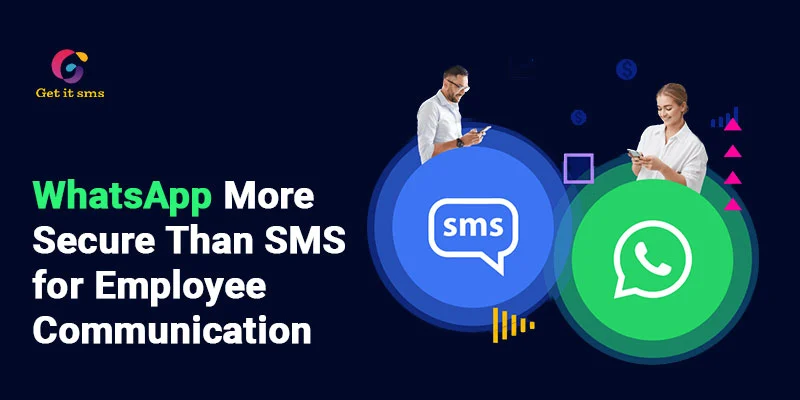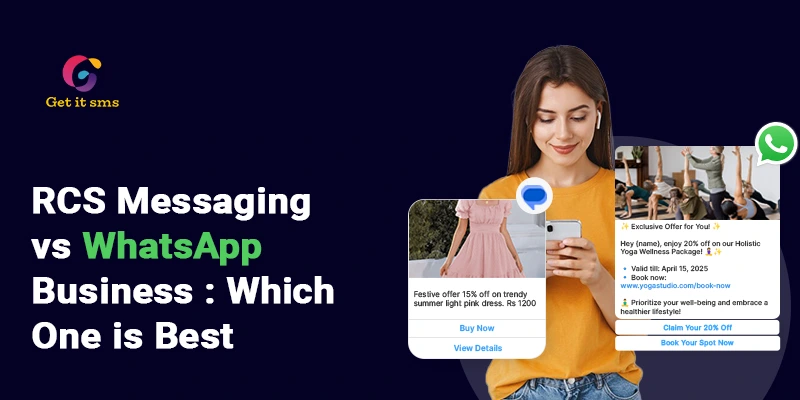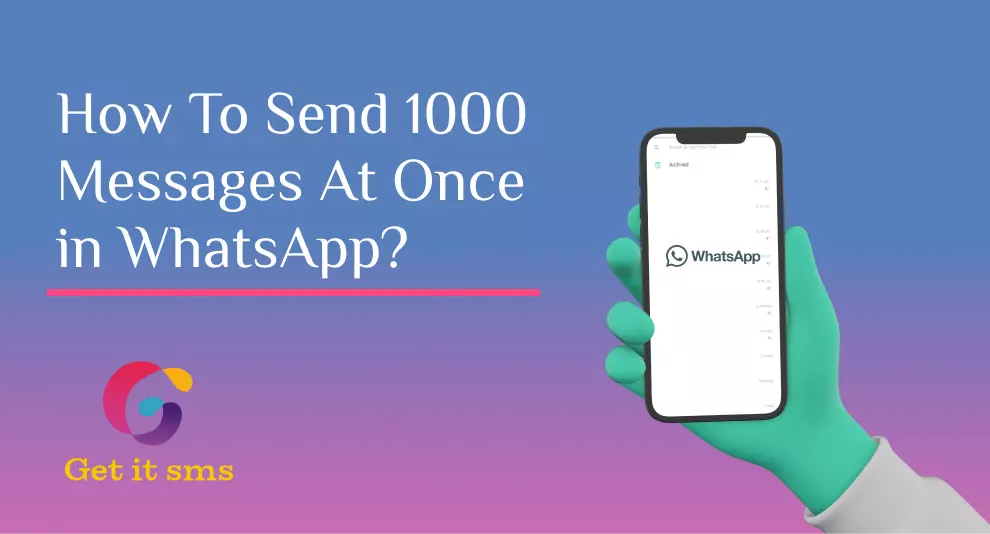Want To Send Bulk SMS?
If yes, then test our service for FREE.
Get a 1 Month Free Trial of WhatsApp Business API
The explanation of why WhatsApp is more secure than texting will be discussed with proven facts. Is using WhatsApp more safer than texting? Of course, we know several safety facts about WhatsApp when communicating with someone. In this digitalized world, the safety of users’ conversations is vital.
Multiple platforms are available in the market, and choosing the correct option that guarantees the user’s confidentiality and innocence of information is critical. WhatsApp stands at the top with a 2 billion user base against traditional SMS for some reasons, especially regarding security.
SMS and WhatsApp marketing methods are the most popular platforms; which is safer? WhatsApp and SMS are both extremely well-known messaging platforms. They have unique features, use cases, and added business value. We likely accept this, but what are the exact comparisons between them? What are their resemblances of them? And most importantly, which option will benefit your business the most?
This blog will contain the basics of both methods and monitor why WhatsApp is more secure than texting for employee communication.
What is WhatsApp for Employee Communication?
WhatsApp for employee communication is a communication service that allows companies and individuals to quickly speak with each other through text, video, images, and GIFs.
WhatsApp for business conversations provides realistic messaging, document sharing, group communication, voice messages, and activating collaboration and information changes within the company.
Know the Basics of WhatsApp Vs SMS
What is SMS?
SMS stands for (short message service) a text messaging service used since 1980. SMSs can be sent and received between two mobile devices using mobile networks. The length of a text message is 160 characters, so it is challenging to convey longer messages.
However, SMS is still a preferred option for businesses to converse with customers as it offers quick and direct communication. One disadvantage of SMS is that it is not encrypted, meaning third parties may intercept messages. This has resulted in the creation of alternative messaging programs like WhatsApp, which promote privacy and security.
What is WhatsApp?
WhatsApp is a vital messaging tool; it allows users in billions will enable them to send messages, including images, voice, documents, and gifs. The application works on both Android and iOS devices.
WhatsApp was founded by two former Yahoo employees in 2009, Jan Koum and Brian Acton. It has gained popularity because of its comfort of use and capability to send messages without incurring SMS charges.
One of the best functions of WhatsApp is its end-to-end chat encryption. This feature ensures that the sender and receiver will only see the message. This has made WhatsApp a top messaging choice for people who understand security and privacy.
Benefits of Using WhatsApp for Employee Communication over SMS
WhatsApp offers multiple features that help connect with different people without paying subscription charges. Let’s review the advantages of using WhatsApp instead of SMS for employee communication.
1. Fast communication
Employees can converse with each other quickly by exchanging messages over WhatsApp, which expedites both problem-solving and company conversation. WhatsApp is the most helpful tool for constantly communicating with employees about changing schedules and workloads or sending documents, such as comfortably creating a group or sharing single messages.
2. Product portfolio
Another benefit of using a WhatsApp business profile is listing your product catalogs and portfolio with up to 30 services and brands. Whenever loyal customers like your product or service, they can easily explore the portfolio, send direct messages, or choose their preferred product to their friends and family.
3. Cost-effective
WhatsApp is cost-effective as it requires internet data to be an effective communication method for companies compared to traditional employee communication, such as phone calls, landline cables, or text messages. This can lead to substantial cost savings for enterprises, increasing the business revenue and enhancing bottom-line benefits in the long run.
4. Accessibility and user-friendliness
WhatsApp is an excellent choice for team members who operate remotely or in various places because it is accessible on both desktop and mobile devices.
Furthermore, because it works with iOS and Android devices, anybody with a smart device can access it anywhere. With 53% of men and 46% of women internationally using WhatsApp for personal reasons, there is no need to teach or guide them while using WhatsApp for business, saving valuable time.
5. Multimedia Sharing
Employees may collaborate and share various multimedia assets, including files, papers, presentations, and videos, allowing firms to increase productivity swiftly.
Furthermore, distributing lessons, product instructions, or troubleshooting videos becomes simple, enhancing the client experience.
Security Perspective: WhatsApp Vs SMS
WhatsApp, a cross-platform messaging application created in 2009, has transformed how people interact. Beyond its user-friendly design and ability to save SMS expenses, the platform’s commitment to privacy sets it apart. WhatsApp’s end-to-end encryption ensures that only conversing parties may read messages; this protection is impossible with SMS.
SMS, the text messaging technology we’ve been using since the 1980s, needs to catch up regarding security. The primary issue with SMS is the lack of encryption, which makes communications subject to interception. The character limit of 160 frequently leads users to truncate messages, which can be inefficient for commercial discussions.
Is WhatsApp Safer Than Texting?
Yes, in very terms, WhatsApp is safer than texting. The reasons why we need to select WhatsApp as a messaging tool are described below.
WhatsApp has been the top-notch choice for communicating with each other worldwide, with a 2 billion user base. Like a large user base, the application has multiple facts to confirm that user’s details are secure and safe from harmful threats. Let’s go through additional reasons why WhatsApp is safer than texting.
1. End-to-end encryption
The most vital security feature is WhatsApp’s end-to-end encryption. This means that only the sender and receiver can read the message. The encryption works by scrambling the message’s content so that only the recipient’s device knows the key to decrypt it. Even WhatsApp cannot see the messages, ensuring their privacy and security.
End-to-end encryption is a must-have feature when cyber dangers are becoming increasingly prevalent in today’s environment. It’s critical to keep your chats and data private, and WhatsApp’s encryption protects your communications from prying eyes.
2. Two-step verification
Another reason why WhatsApp is more secure than texting is two-step verification. SMS does not provide any authentication, unlike WhatsApp. Two-step verification is the safe feature of WhatsApp.
It sticks an extra layer of security to the account, making it difficult for hackers to access your essential data. When two-step authentication is enabled, you must submit a unique six-digit PIN or code every time you install WhatsApp on a new phone or sign in to your account.
The functionality of WhatsApp allows you to safeguard against unwanted access to your account when even someone has your account password. It’s an incredible option to protect your account and ensure your sensitive information is safe and secure.
3. Automatic backup and data storage
WhatsApp’s last most compelling feature is that it makes it safer than texting. WhatsApp allows automatic backup and data storage, suitable for those who want to preserve their data securely. This signifies that all your data, including files, images, and videos, will be saved automatically on your phone or cloud storage. If you lose your device or mobile phone or move to a new one, you can quickly restore your data from the backup.
Automatic backups are an excellent approach to keep your data safe and secure. They let you switch between devices without worrying about losing data or messages. WhatsApp’s automated backup function ensures that your data is always protected, even if your smartphone is lost or stolen.
In conclusion, WhatsApp’s security measures are among the finest in the messaging app globe. End-to-end encryption, two-step authentication, and automatic backups ensure that users’ data and interactions remain secure. These qualities are critical in today’s environment, when cyber dangers are becoming increasingly widespread, and personal information must be secured.
Use Cases: WhatsApp Vs SMS
The use cases of WhatsApp Vs. SMS are discussed below:
1. Authentication & OTPs
Regarding security, the critical use case of both marketing platforms can deal with multi-factor authentication. SMS can receive messages without a stable internet connection, making it a reliable option for businesses to send one-time passwords (OTP).
WhatsApp OTP is encrypted from end to end, making it a secure business option. There is no doubt why WhatsApp is a top choice for every user when sharing OTPs. However, you need to get the consent from the customer we discussed earlier.
2. Sales & Marketing
Sharing the latest deals and offers to your customers through promotional messages could be done quickly through WhatsApp. The platform is more personalized, and the rich media and product communications feature may significantly improve the offers you give to your audience. The conversational aspect of WhatsApp makes it ideal for Conversational Commerce and even aided sales.
It’s an excellent medium for increasing client involvement, but one catch: your consumers must install WhatsApp. SMS may also deliver promotional messages, with an impressive open rate of 98%. Though SMS lacks the rich media features that WhatsApp has built into its platform, it benefits from its fantastic reach.
SMS may also compensate for its lack of rich capabilities by linking to a (fancy) landing page with marketing offers.
3. Notifications
Time-sensitive notifications, such as tracking and order updates, can be sent via WhatsApp. Still, SMS will keep your users notified and updated. However, WhatsApp notifications are restricted to device users only through a WhatsApp account. In contrast, SMS messages will be delivered to the mobile device with a service plan. Eventually, sharing WhatsApp notifications will require a fallback messaging method (SMS) when the customer is not active on WhatsApp.
4. Customer support
Customer support from WhatsApp’s informal and conversational nature is a significant tool. Through the WhatsApp business platform, you can engage your customers and allow them to ask for their queries and issues within an interface with which they are friendly. You can also implement a chatbot to answer common questions and automate their replies and customer support.
How to Setup WhatsApp for Employee Communication
You can contact GetItSMS if you want to set up WhatsApp Business API as a communication channel, or you can follow the easy steps below.
WhatsApp Business API setup can be complex, but it will be easy if you integrate with a WhatsApp Business API solution provider like GetItSMS. However, a brief process layout can help you access WhatsApp Business API.
Step 1. Check WhatsApp Business API policies and limitations
The WhatsApp Business API is only available to users that comply with WhatsApp’s standards and limits. WhatsApp Business API mainly serves significant to medium-sized organizations. Small firms can also use the services, although gaining access is more complicated.
WhatsApp chatbots cannot be used for marketing or promotions. Depending on the industry, additional rules may apply.
Step 2: Register your company with WhatsApp Business.
If your organization meets WhatsApp Business API eligibility requirements, go to the next stage.
- Create a WhatsApp business account with a unique number.
- To register your firm, you must apply for WhatsApp Business API access through WhatsApp.
Step 3: Gain access to WhatsApp API.
- You can apply for WhatsApp Business API feature access through a WhatsApp-recommended business solution provider.
- Requests are often accepted within 1-4 weeks (only when working with a business solution partner). Otherwise, API self-requests require a 6-month waiting time.
- Once your access permission has been received, your company account will be marked with a green tick.
Is WhatsApp More Secure Than Texting to Send Private Pictures?
Yes, the end-to-end encryption or other security features made WhatsApp more secure than texting to send private messages or pictures. People can trust WhatsApp to send images between them. Like other messages, photos are also encrypted.
However, it is mandatory to remember that the default setting of WhatsApp automatically downloads the pictures received from other users on your phone. This shows that whenever someone sends you a picture encrypted with a virus, you can unknowingly download it without touching it or taking a step.
For that explanation, it is advised to change that setting off and only accept photos from people you know and trust. Through WhatsApp Business API, businesses can protect themselves from phishing attacks with more security measures described above. You can also contact GetItSMS to learn how to safeguard yourself and your customers from threats.
Pricing: WhatsApp Vs SMS
Let’s discuss numbers! To begin with, these platforms charge significantly different prices for their services. SMS pricing is frequently tied to volume (per SMS or bundled fees). Still, WhatsApp pricing is conversation-based, with variable charges for different chat kinds.
These pricing methods relate to how these platforms prioritize customer engagement: discussions through the WhatsApp Business Platform vs bulk output via SMS.
SMS is often more expensive since it requires obtaining a business number from an SMS provider (such as GetItSMS). Some number types are free, but you’ll undoubtedly want a short code number as a business.
They appear much more professional and trustworthy. After obtaining a number, SMS providers charge a fee per SMS or bundle. WhatsApp Business Platform costs per chat, with variable fees depending on the discussion type and who began it.
Customer-initiated and utility communications (support and OTPs) are often less expensive than messages initiated by your company (such as marketing messages). Fortunately, each WhatsApp Business Account receives 1,000 free service or customer-initiated conversations every month.
Use GetItSMS as WhatsApp Shared Inbox for Employee Communication
Companies can employ WhatsApp shared inbox to address the limitations of traditional WhatsApp usage for employee conversation. These platforms provide improved safety measures, centralized management, and integration abilities, making them perfect for business communications.
Implementing a suitable WhatsApp shared inbox like GetItSMS guarantees compliance, simplifies internal communication processes, and increases employee collaboration.
Frequently Asked Questions
Q1. Do companies use WhatsApp for internal communication?
A. Businesses widely use WhatsApp for internal communication to improve employee engagement, accelerate operations, and foster collaboration.
Q2. How to use WhatsApp for employee communication?
A. WhatsApp for employee communication can be used by creating dedicated chat groups for projects, teams, and departments or activating real-time communication for collaboration and file sharing.
Q3. Is WhatsApp safer than texting?
A. Yes, WhatsApp is safer than texting. As WhatsApp implements end-to-end encryption, it may be safer than texting compared to traditional messaging tools. You can even change the privacy setting to make it more secure.
Q4. What is WhatsApp for employee communication?
A. WhatsApp for employee communication is a communication service that allows companies and individuals to quickly speak with each other through text, video, images, and GIFs.
Q5. Why should we not use SMS for communication?
A. The primary issue with SMS is the lack of encryption, which makes communications subject to interception. The character limit of 160 frequently leads users to truncate messages, which can be inefficient for commercial discussions.
Conclusion
Security should be the top priority when discussing employee engagement and communication. SMS is a better option, but its lack of encryption and susceptibility to capturing and parody make it not the right platform for employee communication to share sensitive and confidential information.
WhatsApp is the right one and is more secure than texting, with two-step verification, encryption, and auto backups. Additionally, the features of group chat, voice, video calls, and media sharing make it a vital tool for increasing employee productivity and engagement. WhatsApp is the clear choice for organizations looking to safeguard their communications in an increasingly connected environment because it prioritizes security without losing usefulness.




.jpg)






 within 24
Hrs +
60
Days Free API Panel
within 24
Hrs +
60
Days Free API Panel.webp)



